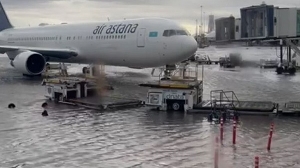General News of Thursday, 9 April 2020
Source: www.ghanaweb.com
No 'trotro', use taxi or 'Aayalolo' - Police to essential workers
After a directive from the president exempted people providing essential services from the lockdown, a measure is being instituted by the police to ensure that persons who are being commuted from their homes are indeed in the bracket.
As awkward as it may seem, passengers of commercial vehicles known in the local parlance as ‘trotro’ from Madina heading to Accra and Kwame Nkrumah Circle were on Thursday morning asked to alight upon reaching Spanner (Accra Mall) and board either a taxi or join the ‘Aayalolo bus’.
“Most of these people are not working, their offices are on break. They’re just taking advantage of the exemption, holding their ID cards to go to town and roam. That is why this is happening today; that, no trotro should work,” a police officer told GhanaWeb.
“If indeed you’re an essential worker and you’re going to work, you can pick a taxi. If you get here in a trotro, we will ask you to pick a taxi or board the Aayalolo bus. It’s because most of the people have taken advantage of the trotro and they’re doing things that they are not supposed to do; it’s not helping us. If you want to work, stay in your community. You can’t come from Madina to Accra. It is not possible,” she explained further.
President Nana Addo Dankwa Akufo-Addo on March 27, 2020 ordered a partial lockdown of Greater Accra, Greater Kumasi, Tema and Kasoa for two weeks as part of the government’s efforts to mitigate the spread of coronavirus in Ghana.
The partial lockdown meant citizens in affected areas would only leave their homes in search of essential items like food, medicine and water.
Some workers described as offering essential services are however permitted to move to their places of work during the 14-day restriction on movement.
These include persons aligned to the production, distribution and marketing of food, beverages, pharmaceuticals, medicine, paper and plastic packages, environmental and sanitation activities, road and railway construction workers, members of the security agencies, workers at fuel stations and staff of utility, telecommunications, e-commerce and digital service providers.












